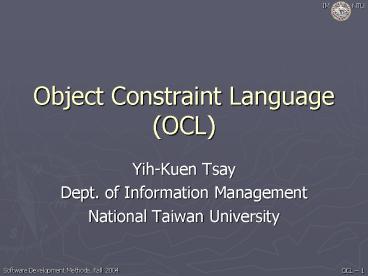Object Constraint Language (OCL) - PowerPoint PPT Presentation
1 / 28
Title: Object Constraint Language (OCL)
1
Object Constraint Language(OCL)
- Yih-Kuen Tsay
- Dept. of Information Management
- National Taiwan University
2
Outline
- Introduction
- Relation with UML Models
- Basic Values and Types
- Objects and Properties
- Collection Operations
3
About OCL
- A formal language for writing expressions (such
as invariants) on UML models. - It can also be used to specify queries.
- OCL expressions are pure specifications without
side effects. - OCL is a typed language.
- Version 2.0 in the finalization process.
4
Why OCL
- UML diagrams do not provide all the relevant
aspects of a specification. - Additional constraints expressed by a natural
language are ambiguous. - Traditional formal languages are precise, but
hard to use. - OCL tries to be formal and yet easy to use.
5
Where to Use UML
- As a query language
- Invariants on classes and types.
- Pre- and post-conditions on operations
- Guards
- Target sets for messages and actions
- Constraints on operations
- Derivation rules for attributes
6
Basic Form
- context TypeName inv
- 'this is an OCL expression with stereotype
ltltinvariantgtgt in the - context of TypeName' 'another string'
7
Class Diagram Example
8
Relation with UML Models
- Each OCL expression is written in the context of
an instance of a specific type. - The reserved word self is used to refer to the
contextual instance. - An explicit context declaration can be omitted if
the OCL expression is properly placed in a
diagram.
9
Invariants
- Inside the class diagram example
- self.numberOfEmployees gt 50
- specifies that the number of employees must
always exceed 50. - Alternatively,
- context Company inv
- self.numberOfEmployees gt 50
- A different name can be used for self
- context c Company inv
- c.numberOfEmployees gt 50
- The invariant itself can also be given a name
(after inv).
10
Pre- and Post-Condtions
- Basic form
- context TypenameoperationName(param1 Type1,
... ) ReturnType - pre param1 gt ...
- post result ...
11
Pre- and Post-Condtions (cont.)
- Example
- context Personincome(d Date) Integer
- post result 5000
- Names may be given
- context TypenameoperationName(param1 Type1,
... ) ReturnType - pre parameterOk param1 gt ...
- post resultOk result ...
12
Package Context
- package PackageSubPackage
- context X inv
- ... some invariant ...
- context XoperationName(..)
- pre ... some precondition ...
- endpackage
13
Operation Body Expression
- context PersongetCurrentSpouse() Person
- pre self.isMarried true
- body self.mariages-gtselect( m m.ended false
).spouse
14
Initial and Derived Values
- context Personincome Integer
- init parents.income-gtsum() 1 -- pocket
allowance - derive if underAge
- then parents.income-gtsum() 1 -- pocket
allowance - else job.salary -- income from regular job
- endif
15
Basic Types
- Boolean true, false
- Integer 1, -5, 2, 34, 26524, ...
- Real 1.5, 3.14, ...
- String 'To be or not to be...'
16
Basic Operations
- Integer , , -, /, abs()
- Real , , -, /, floor()
- Boolean and, or, xor, not, implies, if-then-else
- String concat(), size(), substring()
17
Other Types
- Classifiers
- All classifiers of a UML model are types in its
OCL expressions. - Enumerations
18
Sub-expressions
- context Person inv
- let income Integer self.job.salary-gtsum() in
- if isUnemployed then
- income lt 100
- else
- income gt 100
- endif
19
Definition Expressions
- context Person
- def income Integer self.job.salary-gtsum()
- def nickname String Little Red Rooster
- def hasTitle(t String) Boolean
self.job-gtexists(title t)
20
More about Types and Operations
- Type conformance
- Casting (re-typing)
- Precedence rules
- Infix operators
- Keywords
- Comments
21
Properties
- A property is one of
- An Attribute
- context Person inv
- self.age gt 0
- An AssociationEnd
- An Operation with isQuery
- A Method with isQuery
22
Previous Values in Post-Conditions
- context PersonbirthdayHappens()
- post age age_at_pre 1
- context CompanyhireEmployee(p Person)
- post employees employees_at_pre-gtincluding(p)
and - stockprice() stockprice_at_pre() 10
23
Previous Values in Post-Conditions (cont.)
- a.b_at_pre.c -- takes the old value of property b of
a, say x - -- and then the new value of c of x.
- a.b_at_pre.c_at_pre -- takes the old value of property
b of a, say x - -- and then the old value of c of x.
24
Collections
- Set
- Bag
- OrderedSet
- Sequence
25
Collection Operations
- Select
- context Company inv
- self.employee-gtselect(age gt 50)-gtnotEmpty()
- Reject
- context Company inv
- self.employee-gtreject( isMarried )-gtisEmpty()
26
ForAll Operation
- context Company
- inv self.employee-gtforAll( age lt 65 )
- inv self.employee-gtforAll( p p.age lt 65 )
- inv self.employee-gtforAll( p Person p.age lt
65 ) - context Company inv
- self.employee-gtforAll( e1, e2 Person
- e1 ltgt e2 implies e1.forename ltgt e2.forename)
27
Exists Operation
- context Company inv
- self.employee-gtexists( forename 'Jack' )
- UML OCL 2.0 Adopted Specification 29
- context Company inv
- self.employee-gtexists( p p.forename 'Jack' )
- context Company inv
- self.employee-gtexists( p Person p.forename
'Jack' )
28
Iterate Operation
- Reject, Select, forAll, Exists, and Collect can
all be described in terms of interate. - Example
- collection-gtcollect(x T x.property)
- -- is identical to
- collection-gtiterate(x T acc T2 Bag
- acc-gtincluding(x.property))

